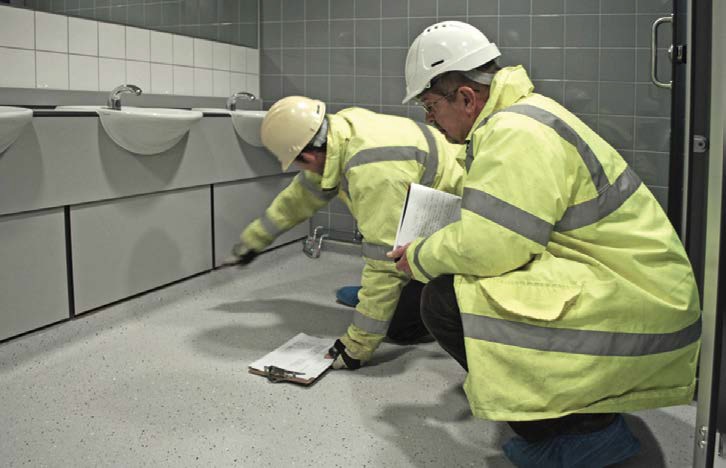Whatever their actual job title, clerks of works perform a vital role in construction projects writes Rachel Morris
The barrister and adjudicator Tony Bingham once declared that “the cost of a clerk of works per annum is cheaper than a day in court.” As the professional body that supports clerks of works and construction inspectors, the Institute of Clerks of Works and Construction Inspectorate (ICWCI) currently has around 1,000 members working in the UK.
In addition, it has members employed in the Republic of Ireland, Spain, China, Hong Kong, Malaysia and Australia as well as various African nations, among other countries.
Principles
Traditionally, building superintendence or site inspection is the role of the clerk of works. Although building practices and procedures have come and gone – and come again in some cases – the very principles for which clerks of works were first established remain as valid today as they have ever been.
The ICWCI defines the role of the clerk of works as: “A person whose duty is to superintend the construction and maintenance of buildings, or other works for the purpose of ensuring proper use of labour and materials” (www.icwci.org).
In many cases, even though this traditional title has given way to modern alternatives such as construction inspector, site inspector and quality auditor, the principle remains the same.
Whether in the field of civil engineering, building, landscaping, tunnelling, electrical and mechanical engineering, new build or refurbishment, at home or overseas, these inspectors ply their trade and ensure value for money for the client through rigorous inspection of the materials in use and the quality of work.
Their skills are honed through study and years of practical experience. They have to remain up to date in terms of legislation and the many relevant regulations, including those relating to individuals – health and safety, race relations, disability discrimination and so on – as well as those concerning construction itself.
Cost savings through rigorous and detailed reporting and recordkeeping and thorough inspection of specifications and drawings, the work of these professionals without questions adds value to any project, even though it may not be obvious at the time. The question that should always be asked is a very simple one: without the intervention of the clerk of works, how much would rectification, remedial action or both of these have cost?
Clients – including employers, local authorities, and housing associations – have to ensure that their construction projects achieve value for money and are completed to a high quality, in terms of the work itself, the materials used, construction standards and compliance with Building Regulations.
Outsourcing of services
Before the mid-1990s, most local authorities in the UK employed teams of clerks of works as part of architects and engineering departments. Under this regime, the clerks’ role was valued, understood and respected.
As the country entered recession during the early 1990s, it prompted cutbacks, rationalisation and compulsory competitive tendering. This resulted in outsourcing of professional services to facilities management companies, and although clerk of works services were not immediately affected, it has become apparent over time that as local authority clerks have retired they have too often not been replaced.
Forms of contract have changed over the years, too, and the ICWCI’s view is that design and build contracts have diluted the role of the clerk of works.
Many clients consider it a saving if the contractor is carrying the risk, for instance, and they do not account for the cost of a clerk or understand the benefits of having one as part of the design team.
In the case of the JCT standard or traditional form contract, the architect is the lead and the clerk of works is named and reasonably empowered.
Under the NEC3 engineering contract there is similarly inclusion for an engineering and construction supervisor, which also recognises the clerk of works’ inspectorial role. Public projects, procured under the private finance initiative, however, are usually silent on the requirement for clerks.
Benefits
Independent third-party inspection by a clerk of works helps to protect the client’s interests throughout the construction process. When employing or appointing a clerk of works or construction inspector, the client will not only benefit in terms of experience, they will also have the reassurance of knowing that their interests are being safeguarded.
Clerks of works have:
- a good general understanding of the specific construction inspection process, in particular around the inspection of materials and quality of work.
- an understanding of the obligations of all parties, including requirements and boundaries.
- the foresight to identify issues or potential issues and the ability to suggest alternative methods or mitigation techniques.
- a focus on quality, reducing the need for reworking and double handling impartiality, offering a fair, considered and independent approach to ensuring value for money for the client an awareness of acceptable standards, benchmarking and identifying where work does not conform to regulation.
- the ability to record findings concisely.
- the ability to offer a professional opinion and recommend alternative approaches and corrective actions knowledge of construction materials and components, including their use, limitations and possible alternatives.
- an understanding and knowledge of the practical and legal aspects of health and safety.
When a clerk of works is appointed, there are a number of factors on which they can focus, including the following:
- Compliance: buildings need to be inspected for safety and structural integrity to ensure that they conform to statutory regulations and laws.
- Quality of work needs to be monitored and inspected at regular intervals to minimise problems, defects and rework.
- Materials should be inspected to ensure that they are correct and of an appropriate quality to fit their purpose.
- Defects can be minimised and resolved when regular, thorough inspection is factored in to the construction process.
- Recommendations: clerks of works can make recommendations to the client throughout the construction process about materials, the quality of work and so on.
A clerk of works’ ability to deal with all five factors, however, will vary according to the basis on which they are contractually employed.
Employment
A clerk of works should be appointed at the earliest possible stage of a project, starting before construction commences so they can work through each subsequent stage.It is usual for a clerk of works to be employed as a representative of the employer or client, typically working under the direction of the architect, engineer or project manager. While employing a clerk of works is not mandatory, it is highly recommended.
Bear in mind that the construction industry continues to be perceived by both its clients and the general public alike as being fragmented, disorganised and unprofessional. Litigation, arbitration and continuing building failures reinforce this view.
The industry has become progressively management-oriented, and contractors increasingly often face the quality–cost–time conundrum – a challenge exacerbated by the decline in skill and resource levels, knowledge gaps and poor standards of work.
Clients and developers for their part demand value for money, cost optimisation and projects that are completed right first time. As a consequence, the quality of work on site has continued to deteriorate, resulting in numerous defects, many of a repetitive nature, as well as delays and additional costs.
Employing a clerk of works can help obviate these issues.
Decline of quality
Yet government legislation along with industry trends such as compulsory competitive tendering for contracts, prices being set lower to increase demand, lack of training and the decline of public control have all exacerbated the reduction in quality in completed products. The burden of remedial costs and users’ dissatisfaction have, conversely, increased.
The clerk of works, traditionally the individual responsible for setting, maintaining and policing quality standards on site, has been among those badly affected by these changes.
With falling numbers of experienced, qualified professionals currently available and few opportunities or incentives for training new practitioners, how will the industry reverse the decline in quality and ensure that the standards required and expected are achieved?
Many of these issues can be mitigated by educating construction industry clients and the design team as to the value of systematic, regular and independent third-party inspection by qualified site inspection practitioners.
The ICWCI continues to push the government to acknowledge there is indeed a greater need to appoint more clerks of works and construction inspectors.
Meanwhile, we have also received useful advice from the Construction Industry Council on skills pathways and reaching out to larger clients, while I am myself providing input on construction quality to the Homes or Londoners subgroup of the Greater London Authority.
Rachel Morris is Chief Executive Officer at ICWCI r.morris@icwci.org







